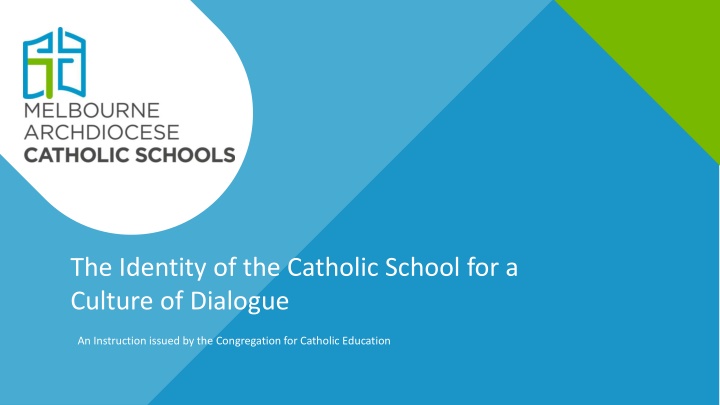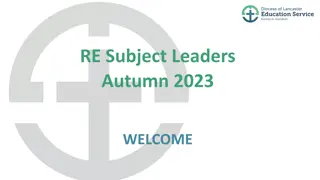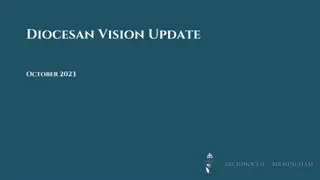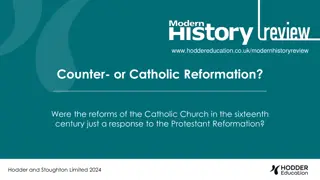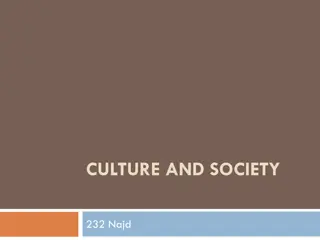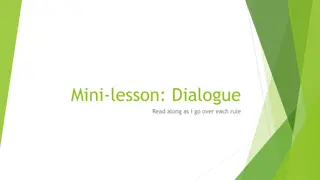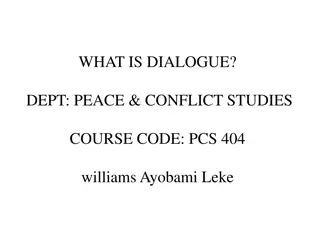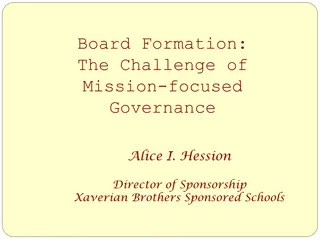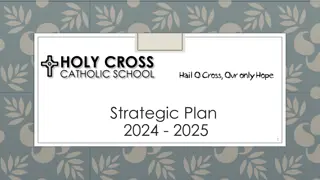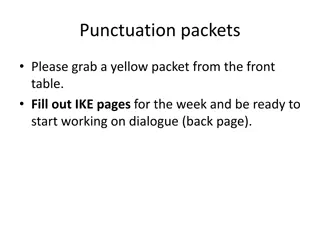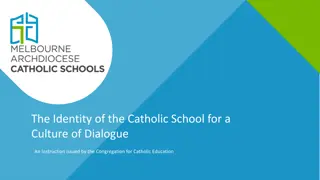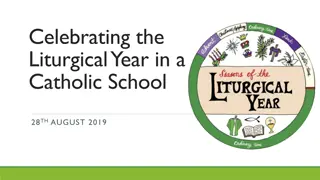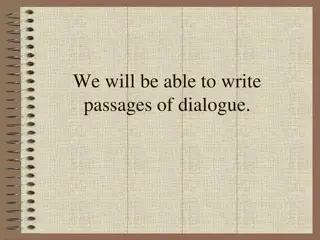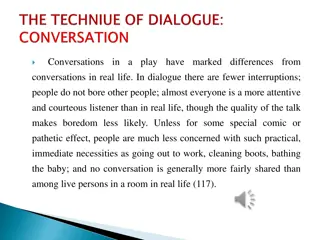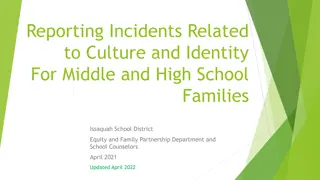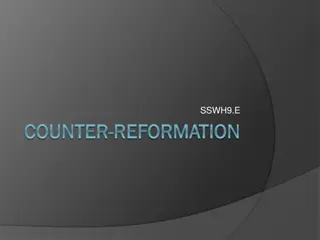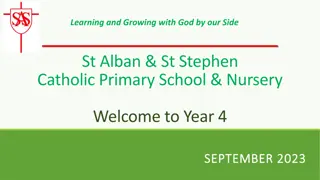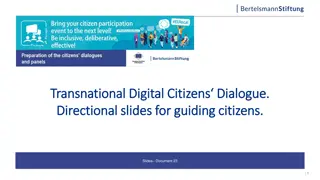The Identity of the Catholic School for a Culture of Dialogue
An instructional document issued by the Congregation for Catholic Education focusing on the identity of Catholic schools for fostering a culture of dialogue. It emphasizes the acknowledgment of the traditional custodians of the land, the mission of Catholic schools in the Church, key principles guiding the formation process, and the importance of heart formation and communal identity in Catholic education.
Download Presentation

Please find below an Image/Link to download the presentation.
The content on the website is provided AS IS for your information and personal use only. It may not be sold, licensed, or shared on other websites without obtaining consent from the author.If you encounter any issues during the download, it is possible that the publisher has removed the file from their server.
You are allowed to download the files provided on this website for personal or commercial use, subject to the condition that they are used lawfully. All files are the property of their respective owners.
The content on the website is provided AS IS for your information and personal use only. It may not be sold, licensed, or shared on other websites without obtaining consent from the author.
E N D
Presentation Transcript
The Identity of the Catholic School for a Culture of Dialogue An Instruction issued by the Congregation for Catholic Education
Acknowledgment of Country We acknowledge that James Goold House, the MACS regional offices and Catholic schools in the Archdiocese of Melbourne are situated on the lands of the five language groups that make up the Kulin Nations, who have walked upon and cared for this land for thousands of years. We acknowledge their continued deep spiritual connection and relationship to Country. We pay respects to their Elders past, present and future, and commit to the ongoing journey of reconciliation. Chelsea Sporle St Anne's School, Sunbury, Year 4
ICS Chapter I: Catholic schools in the mission of the Church Formation for mission is a process that is systematic, collaborative, graduated and ongoing.
Key Principles This process holds itself within relationships built on accompaniment centred on the self, others, creation and God. Catholic educators need a formation of the heart : they need to be led to that encounter with God in Christ which awakens their love and opens their spirits to others, so that their educational commitment becomes a consequence deriving from their faith, a faith which becomes active through love (cf. Gal 5:6) - Educating Together in Catholic Schools, 2007. 25 4
Formation for mission in Catholic education: 1. Is formation of the heart that is characterised by prayerfulness and reflection. Is respectful, experiential and relevant, building on participants personal story and everyday reality. Is explicitly Christological, scripturally rich and ecclesially grounded. Has an affective focus on a person s faith journey and discipleship. Has substantive theological content. 6. Sets out to build communal Catholic religious identity and culture. Is differentiated according to individual and community needs. Promotes personal vocation, connection with the Catholic tradition and responsiveness to mission. Develops the willingness, confidence and capacities of participants in their roles to serve the evangelising mission of Catholic school education. 7. 2. 8. 3. 9. 4. 5. A Framework for Formation for Mission in Catholic Education: p14 5
Leader: Modelled by parents, principals and teachers, in prayer and with wisdom, through witness and by example, Catholic schooling is at the service of the integral human formation of children and young people in Christ. So we pray: All: God, you have made the heavens and the earth. You have revealed your beauty in creation and inspired the gospel from which we proclaim your truth. Please help us now as we read, share and speak together. Take us deeper into understanding more about you and your love for us. Amen. Prayer 6
The Identity of the Catholic School for a Culture of Dialogue Highlights the unique focus and contribution of Catholic education which can provide the sure principle for guaranteeing just relations between people. On 25 January 2022, the Congregation for Catholic Education issued an Instruction on The Identity of the Catholic School for a Culture of Dialogue. Its purpose is to highlight the need for greater awareness and coherence of the Catholic identity of the Church s educational institutions worldwide , the collaboration of the whole school community and the prevention of conflicts and divisions in the essential sector of education . Process: Each section allows us to work though 3 stages: Explore, Reflect and Respond. 7
Chapter I at a glance: Chapter I focuses on Catholic schools in the mission of the Church with 4 sections: The Church, mother and teacher The fundamental principles of Christian education in schools Further developments An education that goes forth It affirms the importance of a Catholic educational project with an evangelical goal. This chapter underscores the intertwining of the nature of education, dialogue and the mission of the Church, clarifying that the educational action pursued by the Church through schools cannot be reduced to mere philanthropic work aimed at responding to a social need, but represents an essential part of her identity and mission. ICS#10: 8
As educators we are key players in the Catholic educational project in which there is no separation between time for learning and time for formation, between acquiring notions and growing in wisdom. (CSTM #14) Explore: travel through (an unfamiliar area) in order to learn about it How can we explore this world with which we are so familiar from a new perspective? What do we know and not know about the purpose of Catholic education?. Focus: What does it mean for us, as educators, that Evangelisation and integral human development are intertwined in the Church s educational work. (ICS #13)? 9
Chapter I: Catholic schools in the mission of the Church Educating is a passion that is always renewed. An opportunity to reflect and deepen our understanding of this important topic which concerns the very essence and raison d treof the Church s historical presence in the field of education and schooling, in obedience to her mission to proclaim the Gospel by teaching all nations (cf. Mt 28:19-20). (ICS #5). In the first place, education, as the formation of the human person, is a universal right (ICS #11). Since education is a right for everyone, the Council called for the responsibility of all. (ICS #12). School has the important task of bringing people into contact with a rich cultural and scientific heritage, preparing them for professional life and fostering mutual understanding (ICS #29). Building on the conciliar declarationGravissimum educationis (GE) which stated certain fundamental principles of Christian education especially in schools (GE #1), and a number of other documents the instruction expands on: - - - the permanent profile of Catholic identity in a changing world; the responsibility of the witness of lay and consecrated teachers and school leaders; the dialogical approach to a multicultural and multi-religious world. (ICS #17). The witness of Catholic educational institutions shows on their part a great responsiveness to the diversity of socio-cultural situations and readiness to adopt new teaching methods, while remaining faithful to their own identity (idem esse). (ICS #18). The school must be the first social setting, after the family, in which the individual has a positive experience of social and fraternal relationships as a precondition for becoming a person capable of building a society based on justice and solidarity, which are prerequisites for a peaceful life among individuals and peoples. (ICS #19). 1/3 10
Chapter I: Catholic schools in the mission of the Church The idea of a Catholic school the educational action pursued by the Church through schools cannot be reduced to mere philanthropic work aimed at responding to a social need, but represents an essential part of her identity and mission. (ICS #10). In the Catholic school s educational project there is no separation between time for learning and time for formation, between acquiring notions and growing in wisdom. (CSTM #14) a true education aims at the formation of the human person in the pursuit of his ultimate end and of the good of the societies of which, as man, he is a member, and in whose obligations, as an adult, he will share (GE #1) The Church is bound as a mother to give to these children of hers an education by which their whole life can be imbued with the spirit of Christ but also to all peoples [to promote] the complete perfection of the human person, the good of earthly society and the building of a world that is more human (GE #3). Evangelisation and integral human development are intertwined in the Church s educational work. (ICS #13). a Catholic school is endowed with a specific identity: i.e. its reference to a Christian concept of life centred on Jesus Christ (ICS #20). For the Catholic school, a great responsibility is to bear witness. (ICS #28). 2/3 11
Chapter I: Catholic schools in the mission of the Church The culture of care and dialogue A distinctive feature of its ecclesial nature is that it is a school for all, especially the weakest. (ICS #22). The history of Catholic schools is characterised by welcoming pupils from different cultural backgrounds and religious affiliations. In this context, what is required [ ] is courageous and innovative fidelity to one s own pedagogical vision , which is expressed in the capacity to bear witness, to know and to dialogue with diversity (ICS #27). The Church considers dialogue as a constitutive dimension, as she is rooted precisely in the Trinitarian dynamics of dialogue, in the dialogue between God and human beings and in the dialogue among human beings themselves. Because of its ecclesial nature, the Catholic school shares this element as constitutive of its identity. It must therefore practise the grammar of dialogue , not as a technical expedient, but as a profound way of relating to others (ICS #30). Pope Francis provided three fundamental guidelines to help dialogue, - the duty to respect one s own identity and that of others, - the courage to accept differences, and - sincerity of intentions. (ICS #30). dialogue, as an authentic expression of our humanity, is not a strategy for achieving specific goals, but rather a path to truth, one that deserves to be undertaken patiently, in order to transform competition into cooperation (ICS #30). The culture of care becomes the compass at local and international level to form people dedicated to patient listening, constructive dialogue and mutual understanding (ICS #36). 3/3 12
Explore: Education + Catholic = Chapter I focuses on Catholic schools in the mission of the Church with 4 sections: 1. The Church, mother and teacher 2. The fundamental principles of Christian education in schools 3. Further developments The dynamic profile of the Catholic school identity The witness of lay and consecrated educators Educating to dialogue 4. An education that goes forth Education as movement A global compact on education Educating to the culture of care Consider the set of key quotations from Chapter 1 and then ask yourself: 1. How are the ideas and information connected to what you already knew? What new ideas did you get that broadened your thinking or extended it in different directions? What challenges or puzzles emerge for you? 2. 3. 13
The characteristic element of the Catholic school, in addition to pursuing cultural goals and the human formation of youth , consists in creating for the school community a special atmosphere animated by the Gospel spirit of freedom and charity . Reflect: to bend back light from a surface Focus: Since Vatican II the school, from a Church point of view , is seen not so much as an institution but as a community. 14
Reflect: Though many, we form one body A reading from Romans 12:1-8 Therefore, I urge you, brothers and sisters, in view of God s mercy, to offer your bodies as a living sacrifice, holy and pleasing to God this is your true and proper worship. Do not conform to the pattern of this world, but be transformed by the renewing of your mind. Then you will be able to test and approve what God s will is his good, pleasing and perfect will. For by the grace given me I say to every one of you: Do not think of yourself more highly than you ought, but rather think of yourself with sober judgment, in accordance with the faith God has distributed to each of you. For just as each of us has one body with many members, and these members do not all have the same function, so in Christ we, though many, form one body, and each member belongs to all the others. We have different gifts, according to the grace given to each of us. If your gift is prophesying, then prophesy in accordance with your faith; if it is serving, then serve; if it is teaching, then teach; if it is to encourage, then give encouragement; if it is giving, then give generously; if it is to lead, do it diligently; if it is to show mercy, do it cheerfully. 15
Reflect: Though many, we form one body Reflect Silently: How does the word Catholic modify the noun education ? What certain quality does it attribute to our understanding of education ? How is this lived out in my community? How can I encourage others to be in touch with this aspect of Catholic education? Share: Each member in turn articulates one quality of Catholic education that transforms education . Catholic education brings the gift of .. to our school community. Key quotes creating for the school community a special atmosphere animated by the Gospel spirit of freedom and charity GE #8 in Christ we, though many, form one body, and each member belongs to all the others. Romans 12:1-8 Catholic identity should be a place of encounter, a tool promoting the convergence of ideas and actions. ICS #84 16
While the dialogical approach to a multicultural and multi-religious world (ICS #17) may be considered new fangled, The history of Catholic schools is characterised by welcoming pupils from different cultural backgrounds and religious affiliations. (ICS #27). Because a Catholic school is a school of the Church it, like the Church, shares dialogue as an essential part of its identity. Catholic schools must therefore practise the grammar of dialogue , not as a technical expedient, but as a profound way of relating to others (ICS #30). Respond: to say something in return Focus: Encountering different perspectives become a resource and a foundational principle for the development of methodologies suitable to solve possible critical issues and find shared solutions. 17
Respond: The Catholic educational project Generic Key Stakeholders may include: Students parent Staff School leadership Principal Parish Priests Custodians of Mission Parish Parishioners Organisations such as Catholic School Parents Victoria Catholic Archdiocese of Melbourne primary school principal association secondary school principal association Melbourne Archdiocese Catholic Schools Consider the set of key quotations from Chapter 1 on slides 10-12 1. Brainstorm a list of difference perspectives of different stakeholders in the Catholic educational project with an emphasis on your local level. Choose one perspective to explore, using these sentence-starters: 2. I am thinking of the Catholic educational project from the viewpoint of ... the viewpoint you ve chosen. I think ...describe the topic from your viewpoint. Be an actor take on the character of your viewpoint. A question I have from this viewpoint is ...ask a question from this viewpoint. 18
In conclusion Each session of formation builds on the past and has a context ahead, so each aspect or session builds into the next. This reflective, developmental process enables participants to apply the experience to their everyday life and their ministry in Catholic education.
The context ahead How can the reflective, developmental process (explore, reflect and respond) impact on the experience of your everyday life and your ministry in Catholic education? What will you take away? What action can we take as a next step to bringing the mission to life? Commit to something today that builds on the experience you shared here today. 20
Leader: Prayerfully, humbly, but boldly, we pick up what earlier pioneers have built and we shape it so that it will continue to serve the people of Melbourne with integrity. All: Lord, your word is a lamp to our feet and a light to our path. Thank you that we can live in Your light and walk in Your truth. May the things that you have revealed and thoughts that we have shared dwell in our hearts and stir us to action. We ask all this in the precious name of Jesus. Amen Closing prayer 21
James Goold House, 228 Victoria Parade, East Melbourne VIC 3002 T: +61 3 9267 0228 E: execdirector@macs.vic.edu.au www.macs.vic.edu.au
